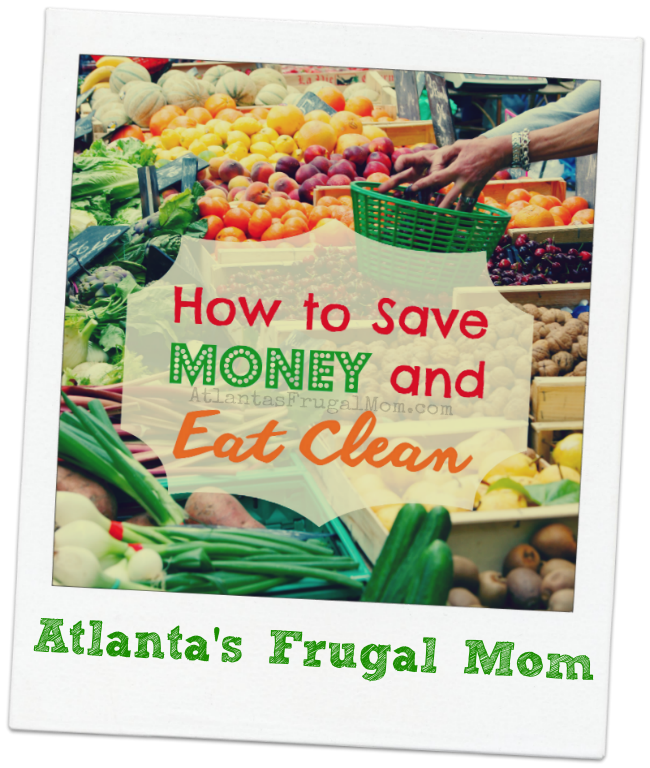The next installment in my New Year, New You series involves clean eating. We’ve discussed the benefits of fitness, as well as simple ways to stay active. So clean eating is the next logical component in this discussion.
Recently, there’s been a huge spike around the world in interest regarding eating clean. Eating clean is a great way to improve your overall health and lose weight if you need to! It can be hard to make this adjustment on a budget though, because there is a misconception about the cost of eating clean. The great news is that there is definitely a way to save money and eat clean!
How to Save Money Eating Clean
The first step to save money and eat clean is set up a budget. Decide how much you are able to spend each month on food, and more importantly how much you want to! No matter what you decide, if there’s a will, there is a way and you can save money and eat clean. Setting a budget is important so you don’t go crazy overspending and ultimately give up because it becomes too expensive.
Next, decide where you’re going to buy produce from. Produce, without a doubt, is the fastest way to rack up a grocery bill when you eat clean, and of course the primary goal is to save money and eat clean! You likely have a couple options in your area: local grocery stores, farmer’s markets, or food co-ops like Bountiful Baskets. Local grocery stores are great in a pinch, but if you can swing a trip to a farmer’s market once a week, you’ll find that you’ll be able to save a lot of money, and the quality of the produce is typically much better. You can’t beat fresh, locally grown food! If you’re unable to do that, you could look into a food co-op. Bountiful Baskets charges around $20 for a basket of produce, and you pick it up once a week. The difference between this and a farmer’s market is that the produce is chosen for you, and it varies week to week.
If you find yourself utilizing your grocery store, make sure you sign up for store loyalty programs. Kroger, for example, frequently sends out coupons tailored to your shopping needs and habits. So if you’re buying fresh fruits and produce, you will start getting coupons to help lower the cost. There are frequent meat coupons as well. Also, determine when your store marks items down in which department, and snag meats, fruits, and veggies on clearance (or “manager’s special”, as Kroger calls them) – most of which can be frozen and therefore used for longer periods of time.
Bonus: utilize your smartphone apps that pay you to get rebates for fresh produce and other “clean” items you buy. Many are starting to see the value in fresh produce, and are rewarding their shoppers in kind.
Another part of eating clean is making smart protein choices, rather than eating fillers high in fat. Protein isn’t something that you’ll necessarily be able to get away with spending $20 a week on, but there are absolutely ways to save on this you can save money and eat clean! Typically, you don’t see many coupons for meats out there, so you’ll have to watch for sales. Local grocery stores are typically a pretty good resource for meats, and you can find some great deals from time to time. Just remember to watch for sales, and stock up when you can! Meat stays fresh for a long time if you freeze it, so take advantage of every sale that you can, this way you can save money and eat clean.
Ultimately, you’ll have to find what works best for your area, whether it’s a food co-op, a grocery store, or a farmer’s market. Plan a budget, stick to it, and make sure to utilize all of the sales, coupons, and rebate offers you can find! Eating clean is a great step on the road to a healthy lifestyle, and saving money while you do it is even better.
Call to action: Do you clean eat? If not, what’s stopping you? If you do, do you have additional tips to help stretch your dollar? Please comment below – I’d love to hear y’alls thoughts. 🙂
You may also like:
Six Shockingly Simple Ways to Stay Active
Smartphone Apps that Pay You to Shop
Keep on saving! :o)--Barbara
**Remember, y'all, this post may contain affiliate links. I receive a small amount of compensation when you purchase from my links, which I"ll totally blow on waffle fries and sweet tea, y'all!**















My produce bill is skyrocketing now that I’m eating low carb. I’m enjoying more green leafy veggies and our son needs fruit for lunch, as well as snacks.
Thanks to the Kroger app and coupons I save on my salad each week.
I wish apps like Ibotta have bonuses for fresh fruits and veggies too.
Joyce, many of the smartphone apps have fruit or veggie rebates – it’s typically 25-50¢, but that’s something at least. You’ve just got to keep your eyes open for them, as they seem to show up sparingly and not for too long. 🙂
I know that eating healthy is costly!! I wish it wasn’t like that though.
Thanks for your tips, more people need to know this. I am going to start going to more farmers markets though